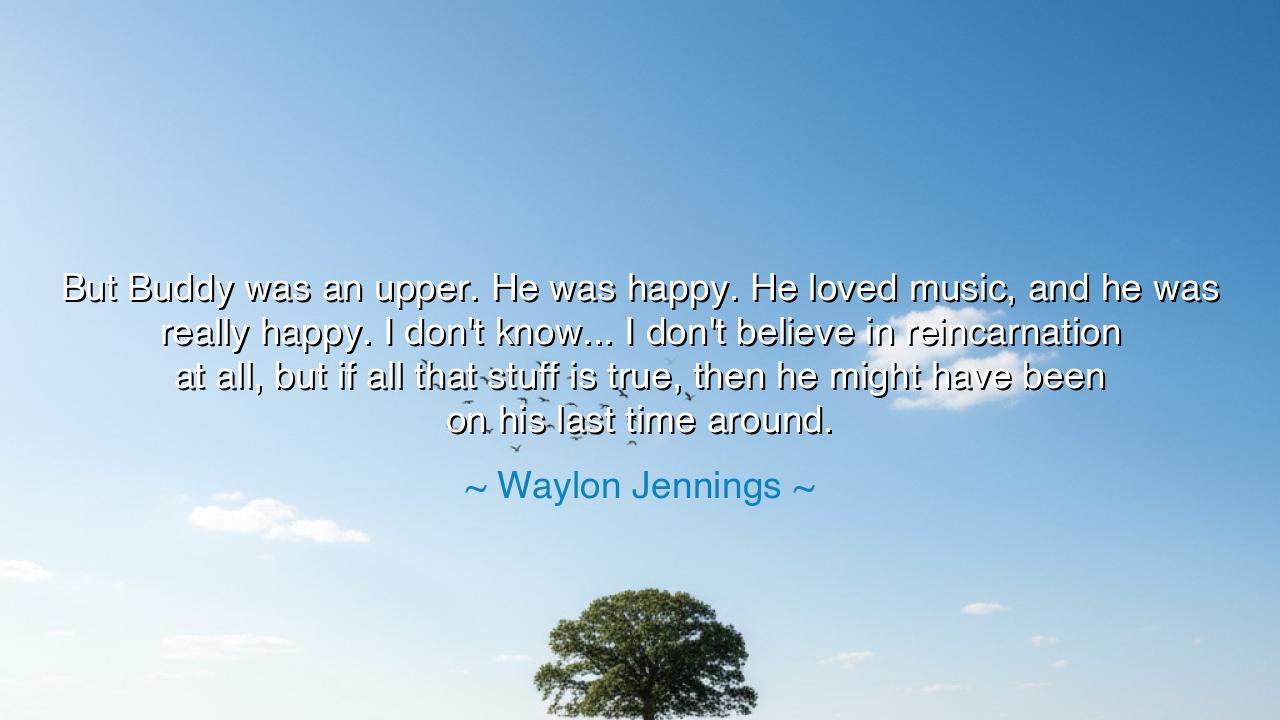
But Buddy was an upper. He was happy. He loved music, and he was
But Buddy was an upper. He was happy. He loved music, and he was really happy. I don't know... I don't believe in reincarnation at all, but if all that stuff is true, then he might have been on his last time around.






When Waylon Jennings spoke of his friend, saying, “But Buddy was an upper. He was happy. He loved music, and he was really happy. I don’t know… I don’t believe in reincarnation at all, but if all that stuff is true, then he might have been on his last time around,” he gave voice to something that echoes through the wisdom of the ages. He was not simply remembering a companion, but describing a soul so full, so luminous, that it seemed as if it had already gathered all the lessons of life, leaving only joy behind.
The ancients would have called such a person blessed, one who had reached a state of completion. For in the old philosophies, there are those who wander many lifetimes—whether literal or symbolic—learning piece by piece the burdens of sorrow, ambition, fear, and struggle. Yet once in a while, a man or woman appears who seems already whole, already wise, already reconciled with existence. Such was Buddy in Jennings’ eyes: not weighed down by shadows, but lifted, radiant, as if nearing the summit of the mountain where no further climbing is needed.
The words remind us that happiness is not an accident. It is the crown of a soul that has chosen to love, to give, to create without bitterness. Buddy’s love for music was not merely the pleasure of sound—it was the outward sign of an inner harmony. To be “an upper” is not to be naïve, but to carry light into the world, to lift others when they stumble. In this sense, Jennings’ reflection is a testament to the highest human achievement: not wealth, not power, not fame, but the ability to be a source of joy.
History, too, shows us figures who seemed to live as if on their “last time around.” Think of Francis of Assisi, who renounced wealth and embraced simplicity, yet carried such profound joy that people were drawn to him as to a flame. His laughter, his love of nature, his songs of praise—all made others feel that he had transcended the usual sorrows of mankind. Like Buddy, he appeared to have learned all that suffering could teach, leaving behind only gratitude and peace. Such people embody a completion that others strive their whole lives to reach.
Jennings himself, a man of shadows and storms, saw in Buddy something he could not claim for himself. This is often the way of it: the troubled soul recognizes the serene one and marvels at its freedom. To call Buddy’s spirit perhaps on its “last time around” is to suggest that some beings live as if they are already near the end of their journey, no longer bound by striving or despair, but walking lightly, as if toward home. Whether or not one believes in reincarnation, the metaphor is clear: some lives shine with the wisdom of many lifetimes distilled into one.
The lesson is this: strive to be such a soul. Strive to live in such a way that your presence is an uplifting to others, that your love is visible, that your craft—be it music, or teaching, or labor of any kind—is infused with joy. Seek not to accumulate riches of the body, but treasures of the spirit: laughter, kindness, resilience, serenity. In doing so, you too may live as if you are nearing completion, as if you are writing the last chapters of a long, noble journey.
Practically, this means cultivating gratitude each day, giving yourself fully to the things you love, and refusing to be consumed by bitterness. It means carrying yourself as one who has already known the futility of envy and the emptiness of greed. Smile more, give freely, forgive quickly, create earnestly. In these acts, you will not only heal your own soul but lighten the burdens of others.
Thus, in Jennings’ tribute, there lies a torch for us all: to be remembered not for our struggles, but for our joy; not for our darkness, but for the light we carried. If one day others may say of you, “They were an upper. They were happy. They loved deeply, and they seemed to have finished their journey well,” then you will have achieved the truest form of success—a life lived in fullness, ready for whatever lies beyond.






AAdministratorAdministrator
Welcome, honored guests. Please leave a comment, we will respond soon